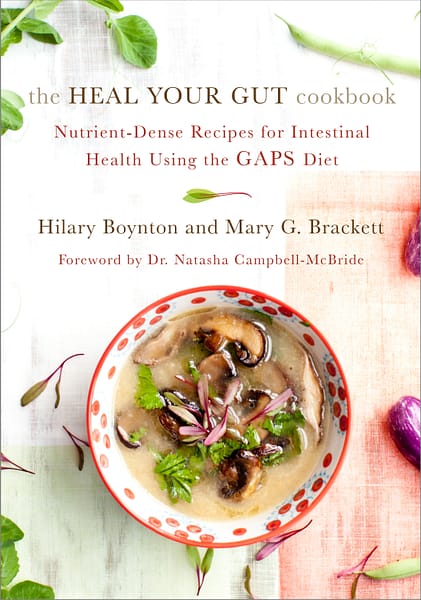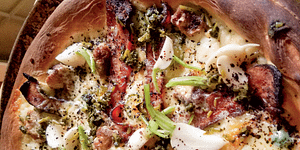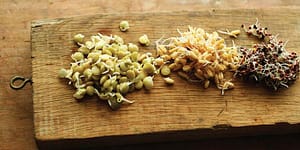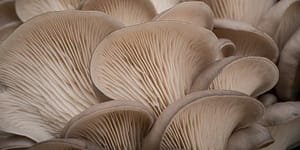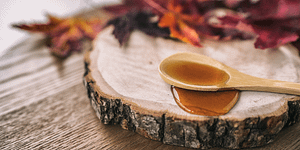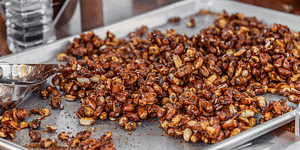Tired of Turkey? Four Ways to Spice Up Thanksgiving Dinner

Want to spice things up for this year’s holiday feast? We’ve got you covered! From delectable pork tenderloin to Spicebush Goose, these recipes will surely delight everyone at your Thanksgiving dinner table, even those passionate turkey traditionalists.
These recipes have been adapted for the web.
Roast Pork Tenderloin and Plum Sauce from The Healthy Bones Nutrition Plan and Cookbook
Serves 4
Ingredients
Pork
- 1 pork tenderloin, hormone- and antibiotic-free
- 1 Tbsp. oil (pistachio oil tastes great with pork)
- 1⁄8 tsp. garlic powder
- 4 cloves garlic, crushed and chopped
- 2 Tbsp. chopped fresh rosemary 1 clove garlic, slivered (optional)
Plum Sauce
- 8 purple plums, pitted and cut into small cubes
- 2 Tbsp. honey, preferably wild thyme or sage
- 4 tsp. raw turbinado sugar
- 6 Tbsp. balsamic vinegar or 2 Tbsp. bone vinegar
- 2 large cloves of garlic, smashed and chopped fine
Directions
Roast Pork Tenderloin: Wash the meat and dry in paper towels. Rub oil all over it, then sprinkle with garlic powder and/or make small slits into the meat every 5 or 6 inches (12.5–15 cm) and insert a garlic sliver into each slit. Holding the rosemary in your palms over the meat, rub to release the oils and cover the surface of the meat. Let it sit for an hour or, covered, up to overnight in the fridge.
When you are ready to cook, preheat the oven to 350°F (177°C) and bring the meat to room temperature. Set it in a pan fat-side down. Insert a meat thermometer. In general roast at 350°F (177°C) for 25 minutes to the pound—for the most tender meat, calculate closely—but oven temperatures vary and it is the internal temperature you’re after.
The thermometer should read at least 145–150°F (63–66°C). After the first 30 minutes turn the meat over to fat-side up. Turn off the oven and allow the meat to sit until the internal temperature reaches 160°F (71°C). Serve immediately. The center should be just barely pink and the juices should run virtually clear.
Plum Sauce: Put all the ingredients into a saucepan. Bring to a boil then cook on low for about 20 minutes. Blend with an immersion stick blender or mash into a uniform sauce.
“Slow and Low” Roasted Leg of Lamb from The Heal Your Gut Cookbook
Serves 8 to 10
Ingredients
- 1 4 pound leg of lamb
- 1⁄4 cup animal fat of choice, warmed: lard, lamb, or beef tallow
- 4 red onions, quartered
- 4 carrots, roughly chopped
- 4 celery stalks, roughly chopped
- 2 cups broth or stock
- 1 bottle dry red wine
- 1⁄4 cup chopped fresh herbs of choice (I like rosemary and thyme)
- 1 bay leaf
- 5 cloves garlic, slightly crushed with side of knife
- Sea salt and pepper
Directions
Take the lamb out of the fridge, and allow it to come to room temperature (about 30 minutes). Preheat the oven to 350°F. Heat the fat of your choice in a Dutch oven, and sauté the vegetables for 5 minutes.
Add the lamb, broth or stock, wine, herbs, bay leaf, and garlic, and cook, covered, in the oven for 3 1⁄2 hours. (You can also transfer to a Crock-Pot and cook for 6 hours on low.) Season with sea salt and pepper. The lamb will be very tender and juicy. Remove the lamb and vegetables to a serving platter; conserve the drippings for the gravy.
Mesquite-Crusted Quail with Chipotle Cream Gravy from Mesquite
Serves 6
Ingredients
Quail
- 1⁄2 cup White Sonora wheat flour
- 1 cup mesquite pod flour
- 2 cups panko ( Japanese-style) breadcrumbs
- 1 tablespoon kosher salt
- 1 tablespoon freshly ground black pepper
- 1 tablespoon Chile Caribe akes or cayenne pepper 2 eggs, beaten
- 1⁄2 cup buttermilk or cream
- 6 semi-boneless quail, pounded and butterflied
- Canola oil
Chipotle Cream Gravy (makes 1 cup)
- 1⁄4 cup red wine
- 2 tablespoons prickly pear or pomegranate syrup
- 1 large chipotle pepper in adobo sauce, finely chopped
- 1 teaspoon sea salt or coarse kosher salt
- 1⁄4 teaspoon freshly ground black pepper
- 1 cup heavy cream
Directions
Quail: Preheat the oven to 350 degrees F.
In one small bowl, mix the flours, panko, salt, pepper, and chile flakes. In another small bowl, beat the eggs and buttermilk to make a wash. Then dip each butterflied quail in the wash, thoroughly moistening the skin. Next dredge it through the panko and flours, coating it with a crust.
Put about an inch of canola oil in the bottom of a heavy- bottomed skillet and warm on medium heat. When the oil is simmering, place the quail in the pan. You may need to do more than one batch. Shake the pan gently to keep the crusted quail from sticking and fry for 3 minutes on each side until golden brown on both sides. Add more oil to the pan between fryings, if necessary.
Place the quail on a baking pan and bake in the oven for 5 to 7 minutes to finish cooking.
Chipotle Cream Gravy: To make the gravy, heat the red wine and prickly pear or pomegranate syrup in a deep-sided, heavy-bottomed 12-inch skillet over medium heat. When the wine sauce begins to bubble, add the chipotle pepper, salt, and black pepper, and stir for about 2 minutes until smooth. Lower the heat, then whisk in the heavy cream.
Remove from heat, strain through a fine metal mesh strainer into a serving bowl. Place each quail on a separate plate, drizzle the chipotle cream gravy over each, and serve while warm.
Spicebush Roast Duck from Forage, Harvest, Feast
Serves 4
Ingredients
Sauce
- 1⁄2 cup (125 ml) clementine (or orange) juice
- 1⁄4 cup (60 ml) Meyer lemon juice
- 3 tablespoons Fermented Serviceberry Syrup
- 3 slices ginger
- 1 lemongrass heart, halved
- 2 Thai lime leaves
- 2 tablespoons soy sauce
- 2 teaspoons ground spicebush
- 1⁄2 cup (125 ml) Nigori sake or water
Duck
- 1 duck, about 6 pounds (23⁄4 kg)
- 1⁄2 teaspoon salt
- 2 tablespoons soy sauce
- 30 spicebush fruit
- 10 field garlic bulbs
- 1 bunch field garlic leaves, about 1 inch (21⁄2 cm) in diameter, bent in half and tied
- 6 spicebush twigs, 6 inches (15 cm) long each
Directions
Sauce: Combine all the ingredients except the sake or water in a small saucepan over medium-high heat and bring to a boil. Turn off the heat and infuse for 30 minutes. Strain the sauce and reserve in a jug.
Duck: Preheat the oven to 450°F (230°C).
Season the duck all over with the salt. Place the soy sauce, spicebush, fruit, field garlic, and spicebush twigs in the cavity. Position a roasting dish or skillet on a low rack in the oven. Place the duck directly above it on a higher rack, allowing the bird to brown all over. Roast for 45 minutes.
Reduce the heat to 325°F (170°C). Continue to roast the duck for 1 hour. Remove the duck carefully from the oven. Tilt it gently over a bowl to catch the accumulated cavity juices. Add these to the reserved sauce. Place the duck on a platter, tent with foil, and rest for 15 minutes.
Carefully remove the roasting dish or skillet with fat from the oven. Pour the melted fat off and save for another use. Deglaze the pan over high heat with the sake or water, stirring well. Add the reserved sauce with duck juices. Cook for a minute at a simmer. Pour into a jug or small bowl and keep warm.
Carve the rested duck by jointing it. With a very sharp knife, cut all the meat from the thighs and drumsticks, then cut into slices. Carve each breast into slices. Cut off all remaining meat and skin. Arrange all the carved duck and its skin on a platter beside a pile of wintercress or watercress.
Recommended Reads
Sweet Brunch Delights: Doughnut Holes, Breakfast Cake & Fruit with Tahini Yogurt
From the Garden to the Bread Basket: Rosemary Bread, Scones and Stuffing
Recent Articles
Nothing says “spring” like a fresh, foraged meal! Savor the flavors of the season with this Milkweed Bud Pizza recipe.
Read MoreWhat’s so great about oyster mushrooms? First, you can add them to the list of foods that can be grown indoors! They are tasty, easy to grow, multiply fast, and they love a variety of substrates, making oyster mushrooms the premium choice. The following is an excerpt from Fresh Food from Small Spaces by R. J.…
Read MoreCraving something sweet? These delicious maple roasted nuts are the perfect treat to help you push through those end-of-winter blues. The following is an excerpt from Full Moon Feast by Jessica Prentice. It has been adapted for the web. The Magic of Maple: A Rich History Following the Hunger Moon, just before the first thaw…
Read More





